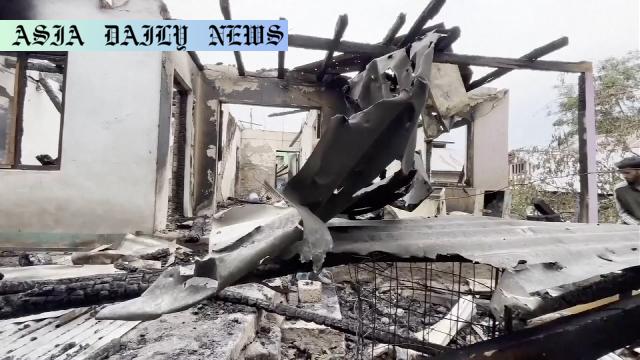De-escalation: Countries around the world urge restraint as tensions between India and Pakistan reach a critical point.
De-escalation efforts urged as tensions rise between India and Pakistan.
Drone attacks and border clashes aggravate the crisis.
Key global figures like US Secretary of State Marco Rubio and EU’s Kaja Kallas advocate dialogue.

Background: Rising Tensions Between India and Pakistan
The escalating tensions between India and Pakistan have captured global attention. This latest conflict erupted with both countries accusing each other of carrying out targeted drone attacks. Reports indicate that the Indian military conducted airstrikes, claiming to have targeted Pakistani air defense radars and systems. On the other hand, Pakistan alleged that it intercepted 25 drones launched by India, while tragically, three Pakistani civilians lost their lives in these attacks. As a result, international concerns about regional stability have reached an all-time high, as this conflict involves two nuclear-armed nations.
Impact on the Disputed Kashmir Region
The disputed region of Kashmir has long been a flashpoint for hostility between the two nations. Recent clashes in this area have only added fuel to the fire. Reports suggest intensified conflict between stationed Indian and Pakistani military forces within the region. These developments pose significant risks, not just for the local population but also for broader regional security. Kashmir remains a symbol of deep-seated enmity and a stark reminder of unresolved geopolitical issues dating back to the partition of British India in 1947. The region’s instability further underscores the urgent need for diplomatic resolutions.
Calls for Global Intervention
Global leaders have weighed in to encourage restraint and diplomacy. U.S. Secretary of State Marco Rubio and EU foreign policy chief Kaja Kallas are among those who have underscored the necessity of de-escalation. Secretary Rubio has reached out to both Pakistan’s Prime Minister and India’s External Affairs Minister, urging for an immediate halt to hostilities and advocating for open dialogue. Similarly, Kallas has emphasized the importance of keeping communication channels open to avoid miscalculations that might further exacerbate the crisis. Such appeals highlight the critical role of international diplomacy in managing escalating conflicts.
Risk of Miscalculation and the Path Forward
As tensions mount, the risk of miscalculation remains significant. A single mistake could spiral into a broader and more devastating conflict, with far-reaching consequences for global security. The situation demands immediate efforts by India and Pakistan to prioritize dialogue over military action. Organizations like the United Nations and neighboring nations should also play an active role in mediating between the two countries to prevent further escalation. In light of the nuclear capabilities held by both nations, all stakeholders must work together to ensure that peace prevails over potential devastation.
Conclusion: Emphasizing Peace and Restraint
In conclusion, the current India-Pakistan conflict underscores the urgent need for restraint and diplomacy. International actors are stepping in to mediate and bring the situation under control, but the primary responsibility lies with the leadership of both nations. It is imperative for India and Pakistan to focus on peaceful resolutions rather than military aggression. This ongoing conflict serves as a sobering reminder of the fragile peace in the region and the potential global impact of any escalated hostilities. It is only through collective effort and continued dialogue that a sustainable solution can be achieved.
Commentary
Global Stakes in the India-Pakistan Standoff
As global citizens, we should all closely monitor the unfolding crisis between India and Pakistan. This is not just a regional conflict; its implications reach far beyond South Asia. The involvement of two nuclear nations in open hostility presents risks for global security that cannot be overstated. The international community’s focused response, as seen through efforts by the U.S. and the EU, underscores the gravity of the situation. However, one must question if enough is being done to address the core issues and foster long-term stability between these two nations.
The Role of Diplomacy and Communication
Diplomacy remains the cornerstone of resolving international conflicts, and the India-Pakistan tension is no exception. Secretary Marco Rubio’s outreach and Kaja Kallas’ emphasis on maintaining open channels of communication are vital steps in the right direction. However, the question remains: how receptive are India and Pakistan to these calls for peace? The cycle of hostility and mistrust between the two nations needs to be broken, and it will require a combination of international mediation and local political will to make that happen. Without sustained dialogue, temporary de-escalation may only delay the inevitable.
Urgency for Public Awareness and Engagement
Finally, this situation serves as a stark reminder of the importance of global awareness and engagement in conflict resolution. While it is easy to feel detached from events occurring thousands of miles away, the interconnected nature of today’s world makes these conflicts relevant to us all. Citizens around the globe should demand their governments to take proactive roles in encouraging peace and should support global peace-keeping efforts wherever possible. Informing oneself and advocating for humane solutions is the least we can do.
Conclusion: A Call for Collective Action
The escalating tension between India and Pakistan is a sobering reminder of the fragility of global peace. It is not merely a bilateral issue but a situation with the potential to affect global stability. Collective action—be it through diplomacy, advocacy, or raising awareness—is needed more than ever. As individuals, we must remember that peace is not an abstract idea but a collective responsibility that requires action, engagement, and unwavering commitment from all stakeholders in society.


